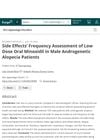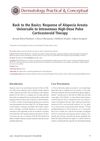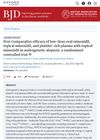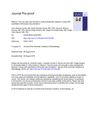Oral contraceptives are generally recommended for healthy young girls, but specific types may vary based on individual health conditions and barrier methods are less popular among adolescents.
12 citations,
January 1987 in “PubMed” Low-dose spironolactone is safe and effective for treating hirsutism.
 January 2025 in “Journal of the American Academy of Dermatology”
January 2025 in “Journal of the American Academy of Dermatology” Low-dose oral minoxidil alone is effective for treating hair loss, but combining it with dutasteride or finasteride may offer better results.
 July 2024 in “Skin Appendage Disorders”
July 2024 in “Skin Appendage Disorders” Low dose oral minoxidil is safe for treating hair loss in men.
39 citations,
November 2017 in “PubMed” Low-dose naltrexone helps reduce symptoms and slow down lichen planopilaris without side effects.
 April 2019 in “Journal of emerging technologies and innovative research”
April 2019 in “Journal of emerging technologies and innovative research” Early treatment of Female Pattern Hair Loss is important to stop it from getting worse, and various treatments can help, especially in mild to moderate cases.
 32 citations,
September 2016 in “Dermatologic Surgery”
32 citations,
September 2016 in “Dermatologic Surgery” The evidence for using Low-Level Laser Therapy for hair loss is limited and more thorough research is needed.
 22 citations,
February 2010 in “The Veterinary clinics of North America. Small animal practice/Veterinary clinics of North America. Small animal practice”
22 citations,
February 2010 in “The Veterinary clinics of North America. Small animal practice/Veterinary clinics of North America. Small animal practice” The cause of atypical Cushing's syndrome in dogs, possibly linked to sex hormones, is not yet proven.
 January 2022 in “Journal of Skin and Stem Cell”
January 2022 in “Journal of Skin and Stem Cell” Trichodynia is a painful scalp condition needing targeted treatments beyond symptom management.
 24 citations,
January 2013 in “Indian Journal of Dermatology, Venereology and Leprology”
24 citations,
January 2013 in “Indian Journal of Dermatology, Venereology and Leprology” Hormonal treatment is effective for women with acne not helped by usual treatments, especially if they have hormonal imbalances.
 May 2020 in “Current developments in nutrition”
May 2020 in “Current developments in nutrition” Low dose finasteride doesn't change lipid profile or metabolic parameters in mice.
 93 citations,
October 2006 in “The International Journal of Biochemistry & Cell Biology”
93 citations,
October 2006 in “The International Journal of Biochemistry & Cell Biology” Melanocytes are crucial for skin pigmentation and can affect conditions like melanoma, vitiligo, and albinism, as well as hair color and hearing.

Low-dose oral isotretinoin improved hair loss and facial bumps in patients with a specific type of hair loss.
 1 citations,
January 2020 in “Recent Research in Genetics and Genomics/Recent Research in Genetics and Genomics ”
1 citations,
January 2020 in “Recent Research in Genetics and Genomics/Recent Research in Genetics and Genomics ” High doses of Lepidium sativum seed extract are toxic and should be used with caution.
 August 2023 in “JAAD International”
August 2023 in “JAAD International” Low dose oral minoxidil is generally safe and can improve hair loss in women, with some experiencing side effects and minimal blood pressure changes.
 July 2024 in “Journal of Investigative Dermatology”
July 2024 in “Journal of Investigative Dermatology” Most women continued using oral minoxidil for hair loss despite mild to moderate side effects.
 August 2023 in “Veterinary Record Case Reports”
August 2023 in “Veterinary Record Case Reports” High-dose ciclosporin significantly improved a young cat's severe skin condition.
 January 2017 in “Faculty Opinions – Post-Publication Peer Review of the Biomedical Literature”
January 2017 in “Faculty Opinions – Post-Publication Peer Review of the Biomedical Literature” 60% of women who didn't respond to 5% minoxidil for hair loss showed significant improvement with a 15% minoxidil solution.
 19 citations,
May 2020 in “Journal of The American Academy of Dermatology”
19 citations,
May 2020 in “Journal of The American Academy of Dermatology” Low-dose oral minoxidil improves hair growth in male hair loss.
 3 citations,
November 2021 in “Journal of The American Academy of Dermatology”
3 citations,
November 2021 in “Journal of The American Academy of Dermatology” Androgenetic alopecia, a genetic disorder affecting up to 50% of adults, is caused by an excessive response to androgens leading to hair follicle shrinkage. Treatments include FDA-approved drugs, other therapies like low-dose oral minoxidil, and hair transplantation.
 October 2021 in “Dermatology practical & conceptual”
October 2021 in “Dermatology practical & conceptual” High-dose corticosteroids can significantly regrow hair in severe alopecia areata.
 June 2024 in “Journal of cosmetic dermatology”
June 2024 in “Journal of cosmetic dermatology” Dutasteride is the most studied alternative drug for androgenetic alopecia, but more high-quality research is needed.
 19 citations,
February 2017 in “Journal of radiation research”
19 citations,
February 2017 in “Journal of radiation research” High-dose radiation speeds up aging in skin stem cells.
 June 2024 in “British Journal of Dermatology”
June 2024 in “British Journal of Dermatology” PRP with topical minoxidil is the most effective treatment for increasing hair density in androgenetic alopecia.
August 2022 in “Journal of The European Academy of Dermatology and Venereology” March 2023 in “Journal of Cosmetic Dermatology” Low-dose oral minoxidil improved hair growth when topical treatments failed.
 3 citations,
September 2019 in “Journal of The American Academy of Dermatology”
3 citations,
September 2019 in “Journal of The American Academy of Dermatology” Low-dose oral minoxidil effectively treats mild-moderate male hair loss, alone or combined with other therapies.
 52 citations,
May 2019 in “Journal of The American Academy of Dermatology”
52 citations,
May 2019 in “Journal of The American Academy of Dermatology” Low-dose oral minoxidil effectively improves male hair loss with mild side effects.
2 citations,
January 2022 in “Skin appendage disorders” Low-dose oral minoxidil effectively promotes hair growth but has associated risks.
 14 citations,
August 2020 in “Dermatologic Therapy”
14 citations,
August 2020 in “Dermatologic Therapy” Low-dose oral minoxidil is a safe treatment for hair loss, with the main side effect being excessive hair growth. Other side effects like foot swelling, low blood pressure when standing, and heart rate changes are rare.























